101 scholarly books by National University of Singapore Press and 5
start with N
101 scholarly books by National University of Singapore Press and 5
101 scholarly books by National University of Singapore Press
5 start with N start with N
5 start with N start with N
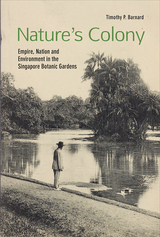
Nature's Colony
Empire, Nation and Environment in the Singapore Botanic Gardens
Timothy P. Barnard
National University of Singapore Press, 2017
Established in 1859, the Singapore Botanic Gardens are arguably the most important colonial botanic gardens in the world. Not only have the Gardens been important as a park for Singaporeans and visitors, they have had a significant role as a scientific institution and as a testing ground for tropical plantation agriculture implemented around the world. As Timothy P. Barnard shows in Nature’s Colony, underlying each of these uses is a broader story of the Botanic Gardens as an arena where power and the natural world meet and interact.
Initially conceived to exploit nature for the benefit of empire, the Gardens were part of a symbolic struggle by administrators, scientists, and gardeners to assert dominance within Southeast Asia’s tropical landscape, reflecting shifting understandings of power, science, and nature among local administrators and distant mentors in Britain. Consequently, as an outpost of imperial science, the Gardens were instrumental in the development of plantation crops, such as rubber and oil palm, which went on to shape landscapes across the globe. Since the independence of Singapore, the Gardens have played a role in the “greening” of the country and have been named as Singapore’s first World Heritage Site. Setting the Gardens alongside the Royal Botanic Gardens, Kew, and botanic gardens in India, Ceylon, Mauritius, and the West Indies, Nature’s Colony provide the first in-depth look at the history of this influential institution.
Initially conceived to exploit nature for the benefit of empire, the Gardens were part of a symbolic struggle by administrators, scientists, and gardeners to assert dominance within Southeast Asia’s tropical landscape, reflecting shifting understandings of power, science, and nature among local administrators and distant mentors in Britain. Consequently, as an outpost of imperial science, the Gardens were instrumental in the development of plantation crops, such as rubber and oil palm, which went on to shape landscapes across the globe. Since the independence of Singapore, the Gardens have played a role in the “greening” of the country and have been named as Singapore’s first World Heritage Site. Setting the Gardens alongside the Royal Botanic Gardens, Kew, and botanic gardens in India, Ceylon, Mauritius, and the West Indies, Nature’s Colony provide the first in-depth look at the history of this influential institution.
[more]
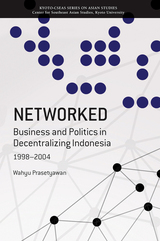
Networked
Business and Politics in Decentralizing Indonesia, 1998-2004
Wahyu Prasetyawan
National University of Singapore Press, 2018
B. J. Habibie may have served the shortest term of any of Indonesia’s presidents, but his push for decentralization would affect the country for decades. Habibie came to power in 1998 and immediately set to work restructuring the government. He gave local districts more power, allowing them to elect their own leaders and create their own bylaws. After years of authoritarian rule, these reforms were meant to return power to the people. But that led to local governments engaging in bureaucratic and political conflict with the central government over control of valuable natural resources and the distribution of the revenue they generated. Decentralization became the most important political economic development in Indonesia of the past thirty years.
Networked Business and Politics in Decentralizing Indonesia evaluates three cases of deep-seated political conflict and intrigue including central government, local governments, and multinational companies. It looks at how the structure of the national political economy has changed as the result of local politicians becoming involved in disputes with the national government over control of natural resources. It also analyzes how these changes will affect the distribution of wealth in the country as well as Indonesia’s evolving democratic politics and modes of governance.
Networked Business and Politics in Decentralizing Indonesia evaluates three cases of deep-seated political conflict and intrigue including central government, local governments, and multinational companies. It looks at how the structure of the national political economy has changed as the result of local politicians becoming involved in disputes with the national government over control of natural resources. It also analyzes how these changes will affect the distribution of wealth in the country as well as Indonesia’s evolving democratic politics and modes of governance.
[more]
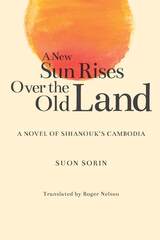
A New Sun Rises Over the Old Land
A Novel of Sihanouk’s Cambodia
Suon Sorin
National University of Singapore Press, 2020
This is the story of Sam, a young man who leaves the countryside for the big city to work as a cyclo driver, piloting his three-wheeled bicycle taxi through busy streets. Sam just wants to earn an honest wage, but he is constantly thwarted by those with money: his landlord, factory bosses, politicians, even the woman who rents him his cyclo. The city takes its toll, and Sam’s humanity is denied him at every turn, leading to the devastation of his small family and his surrender to temptation. But a dramatic change to Sam’s fortunes is heralded by the country’s liberation from colonial rule. Sam returns to the countryside to discover that “the life of the peasants that had been filled with suffering and decline, was filled with a fresh joy and happiness, and a new hope.”
First published in 1961, eight years after Cambodia gained independence from French colonial rule, A New Sun Rises Over the Old Land is an iconic work of modern Khmer literature, a singularly illuminating document of the new nation. This is one of the first English translations of a modern Khmer novel, and the text is accompanied by an extended introduction that situates the author in his historical and artistic context and examines the novel’s literary value.
First published in 1961, eight years after Cambodia gained independence from French colonial rule, A New Sun Rises Over the Old Land is an iconic work of modern Khmer literature, a singularly illuminating document of the new nation. This is one of the first English translations of a modern Khmer novel, and the text is accompanied by an extended introduction that situates the author in his historical and artistic context and examines the novel’s literary value.
[more]
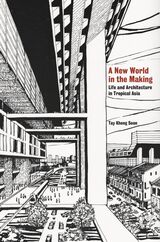
A New World in the Making
Life and Architecture in Tropical Asia
Tay Kheng Soon
National University of Singapore Press, 2023
A memoir and collection of essays on architecture and urbanism from one of the most interesting figures in Singapore’s cultural landscape.
According to architect Tay Kheng Soon, the time has come to change and build a new world. The feeling has impelled him to write this book, bringing together memoir and writings on identity, landscape and belonging, and on architecture and urbanism. Born in British-ruled Singapore, Soon was deeply engaged in the debates about building a new world that attended the end of colonialism. His focus, but far from his only concern, was Singapore's built environment—and its spiritual one—since the early 1960s. A New World in the Making is a must-read reflection on tropical Asia, on architecture and urbanism, and on looking ahead to the always urgent task of building a new world.
According to architect Tay Kheng Soon, the time has come to change and build a new world. The feeling has impelled him to write this book, bringing together memoir and writings on identity, landscape and belonging, and on architecture and urbanism. Born in British-ruled Singapore, Soon was deeply engaged in the debates about building a new world that attended the end of colonialism. His focus, but far from his only concern, was Singapore's built environment—and its spiritual one—since the early 1960s. A New World in the Making is a must-read reflection on tropical Asia, on architecture and urbanism, and on looking ahead to the always urgent task of building a new world.
[more]
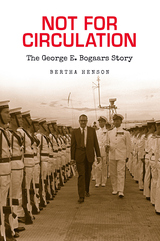
Not for Circulation
The George E. Bogaars Story
Bertha Henson
National University of Singapore Press, 2022
The story of George Bogaars, a civil servant who played a key role in Singapore’s political history.
Do civil servants make a difference? Can they shape history? In 1985 when John Drysdale published one of the first books on the political history of independent Singapore, George E. Bogaars wrote to his daughter with typical understatement, “I feature in it a bit.” Bogaars headed the special branch at the time of Operation Cold Store. He reported directly to pioneer leaders such as Lee Kuan Yew and Goh Keng Swee before they became political icons. He started the Singapore Armed Forces from scratch when he was Permanent Secretary of the Interior and Defence. He was the head of the civil service, involved in a dozen or so government-linked companies attempting to shore up the country’s infrastructure, and expand its business portfolio. He held the country’s purse strings when he moved into the finance ministry before his retirement at the age of fifty-five. His impressive resume belies a colorful, flamboyant character with a wicked sense of humor. Veteran Singaporean journalist Bertha Henson tells his story.
Do civil servants make a difference? Can they shape history? In 1985 when John Drysdale published one of the first books on the political history of independent Singapore, George E. Bogaars wrote to his daughter with typical understatement, “I feature in it a bit.” Bogaars headed the special branch at the time of Operation Cold Store. He reported directly to pioneer leaders such as Lee Kuan Yew and Goh Keng Swee before they became political icons. He started the Singapore Armed Forces from scratch when he was Permanent Secretary of the Interior and Defence. He was the head of the civil service, involved in a dozen or so government-linked companies attempting to shore up the country’s infrastructure, and expand its business portfolio. He held the country’s purse strings when he moved into the finance ministry before his retirement at the age of fifty-five. His impressive resume belies a colorful, flamboyant character with a wicked sense of humor. Veteran Singaporean journalist Bertha Henson tells his story.
[more]
READERS
Browse our collection.
PUBLISHERS
See BiblioVault's publisher services.
STUDENT SERVICES
Files for college accessibility offices.
UChicago Accessibility Resources
home | accessibility | search | about | contact us
BiblioVault ® 2001 - 2024
The University of Chicago Press









